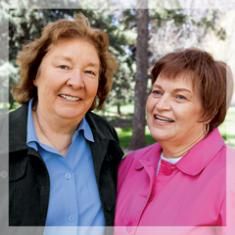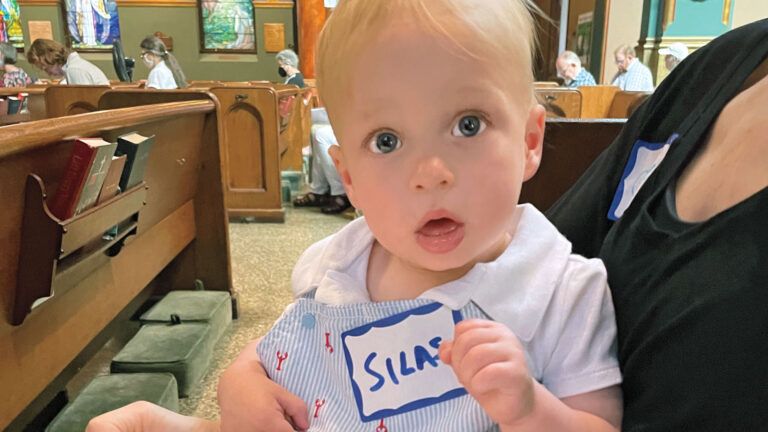Melody
For 24 years my world revolved around my only child, my daughter, Jill. Her father and I had divorced, and it was just the two of us.
Jill was such a warm and giving person, and the career she’d chosen—teaching elementary school children—seemed just right for her. I was so proud her first day of school last fall, I couldn’t resist taking a picture of her.
Now it was September again, a year later. I sat at my kitchen table, trying to start a letter. Instead, I kept looking at that snapshot of my daughter, with her big smile that could light up a room.
But that light had gone out Memorial Day weekend, when Jill was killed in a car accident. Ever since, my world had seemed dimmed…darker and smaller and lonelier. Not that my friends from church and from the bank where I worked weren’t supportive—they were wonderful—but I needed a comfort they couldn’t give.
What I’d clung to these past months was that some good had come out of Jill’s death. Her other organs had been badly damaged, but her liver had gone to a 58-year-old woman here in Colorado. That was all I knew and I ached to know more.
Enough time had passed that I could contact the recipient through Donor Alliance, the group that coordinated the transplant. I’d been thinking about this letter for months, but how do you sum up 24 years in a few paragraphs?
Finally I picked up my pen. “I am writing to wish you well with your liver transplant, and to acquaint you with the donor, my daughter, Jill. Jill chose to be an organ donor when she got her license. That is truly the kind of person she was.”
I told her a little more about Jill and finished with, “I hope you will be interested in corresponding with me.” Then I put the letter in an envelope, along with Jill’s photo tucked inside a smaller envelope, said a prayer, and headed out to the mailbox.
Carole
That letter from my donor’s mother haunted me. I knew I should write back, and every few months, I’d try, but I couldn’t find the words any more than I could bring myself to open up the little envelope she’d enclosed and look at Jill’s picture.
The first time, I’d started simply: “Thank you so much for your letter and your memories of your daughter, Jill. I know she meant the world to you, as I have a 27-year-old daughter.”
That’s where I’d stopped. What if it had been my daughter, Kim, who’d died? I would have been grief-stricken, unable to function. Yet this mother, at the moment of her greatest devastation, had found the strength to give a perfect stranger an incredible gift. I felt so unworthy!
The second time, I tried to tell her how the transplant came right when I’d given up hope.
“At my weekly visit the doctor told me he wouldn’t be seeing me again. After five years of waiting for a liver and twice having transplants fall through, there was nothing he could do. I went home to die. That’s when I got the call about Jill’s liver.”
Then I was unable to go on. It didn’t seem right that I was getting a second chance at age 58 when her daughter’s life had been snuffed out at 24.
The third time, I wanted to tell her what a blessing the transplant was, how grateful I was to be able to experience life—an active, energetic life—for the first time in years. But what could I say that could possibly make up for what she had lost?
Now I was about to leave for a visit with Kim in D.C. I found myself sitting down at my desk in the den, opening the drawer where I kept the letter from Jill’s mother. There, next to it, was the envelope with the photo I’d never been able to look at. It had been over a year since the transplant. How could I write back now? What must she think of me?
God, forgive me, I thought as I closed the drawer, feeling ashamed of myself. You know how grateful I am. Help me find a way to honor Jill and her mother someday.
Melody
Nine months since I’d written the recipient, and still no word from her.
At first, I was worried. I even called Donor Alliance, afraid she’d fallen ill again or died, but they assured me she was well. Then I fumed. How hard was it to write back? Could this woman really be so unfeeling?
I still checked the mail as soon as I got home from work, but now I was more resigned than angry. Maybe there was a reason I hadn’t heard back. Maybe God would show me another way to make the end of Jill’s life matter as much as the rest of it had.
One evening I tossed the mail on the kitchen table. Just the usual bills and catalogs. But as they scattered, a flyer caught my eye: “Donor Dash 2004. A 5K run/walk honoring the lives of organ donors and recipients.” Why not?
The Donor Dash was on a perfect summer day. With two friends, I walked the route around Washington Park, on Denver’s south side.
There were a few hundred people—some ran, some walked, some had dogs or kids in strollers with them. All of them, in some way, had gone through what I had. Maybe it was that sense of community, but for the first time since Jill’s death, I found myself laughing.
“That was fun,” I heard myself saying as we crossed the finish line. I noticed a number of people did the Dash in teams, wearing T-shirts with photos of donors. Next year I’ll do that, I thought. Round up some more friends and put Jill’s picture on our shirts.
Carole
Not long after Kim moved to Colorado, I saw a flyer for the Donor Dash 2007. It stopped me cold.
I thought of Jill and her mother, and the time their gift had given me to spend with my daughter. Had it really been four years since the transplant?
I decided that Kim and I were going to do the Dash, even if it was just two days away. Some of the people shown in the flyer wore shirts with photos of their donors. I knew where I had a picture like that.
I went to my desk in the den and opened the drawer. I took out that little envelope. Slowly, carefully, I pulled out the photo of Jill and looked at it for the first time. She was lovely, with a big, bright smile that reminded me of Julia Roberts. My fingers trembled as I held the photo. Maybe, after all this time, I had found a way to show my gratitude.
The day of the dash was sunny and warm. The course was jammed with more than a thousand people. I couldn’t believe how many lives were touched by organ donation.
By the time Kim and I could see the finish line, sweat was cascading down my face. I’d walked the entire route so far. Not bad for someone who just a few years earlier barely had the energy to stand.
The last hundred yards or so, I noticed a woman in a blue T-shirt staring at Kim and me. She finally came up to us and asked, “How come you have Jill’s picture on your back? Are you a friend of Mel’s?”
“I don’t know who Mel is,” I said, a little startled. “But Jill donated the liver that’s keeping me alive.”
Her eyes got huge. “You’re…you must be…would you like to meet Jill’s mother?” she burst out. “I know where she is.” Before I could answer she dashed off toward the finish line.
Mel…of course, that had to be short for Melody, Jill’s mother. We hurried after the woman in blue. I crossed the finish line and there were dozens of people, all wearing those blue T-shirts in memory of Jill, all applauding.
So many people started reaching out to hug me that I couldn’t find Melody at first. When I did, all I could get out was, “I’m Carole” before we fell into each other’s arms and burst into tears.
Melody
Finally I took a step back so I could look into Carole’s eyes. Then I asked what I’d been wondering all these years. “Why didn’t you ever write?”
I thought Carole was going to start crying all over again. “Have you ever received a gift so precious that you didn’t know how to say thank you? I couldn’t even look at Jill’s picture until a couple days ago,” she said, then held me close again. “I’m so glad I got a chance to thank you in person.”
At last I understood. Carole hadn’t been unfeeling at all. If anything, she’d felt too much, like me.
I think God was patiently waiting for the right time to bring us together. That moment at the finish line was the start of a great friendship and partnership, kind of like the way the end of Jill’s life gave Carole a new beginning.
Together, Carole and I give talks about organ donation, and the more people we reach, the bigger and brighter and more connected the world seems.




